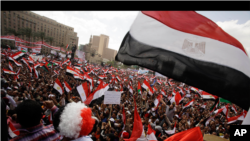A Washington-based scholar says Egypt could be plunged into crisis if the military council is seen as pressuring the election commission to declare former Prime Minister Ahmed Shafiq winner of the presidential run-off vote.
“If the announcement is that Ahmed Shafiq has won, there could be chaos in Egypt. There would certainly be widespread rejection of the supposed outcome, and there would be continuing demonstrations, and in fact it would get quite ugly,” said Samer Shehata, Assistant Professor of Arab Politics at Georgetown University.
“The majority of people who voted in the election run-off didn’t vote for either of the two candidates. They voted against them because of their polarizing attitude and background,” he said.
Some analysts predict Muslim Brotherhood-backed candidate Mohammed Morsi is likely to win the vote after collating unofficial results across the country.
Observers say over the last several weeks, establishment-backed Ahmed Shafiq appeared to have enjoyed better state media (radio, television and internet) coverage ahead of the vote. But, according to Shehata, the media advantage does not seem to have significantly benefitted him.
“The vote seems to be 900,000 plus in Mohammed Morsi’s favor, so that does not seem to have worked.”
Chancellor Hatem Bagato, Secretary General of Egypt’s Presidential Elections Committee, says the outcome of the election will be announced this weekend. Bagato said parties of both presidential candidates have logged complaints about the conduct of the vote, which he said needs to be resolved before the announcement.
So far, both presidential candidates, Mohammed Morsi of the Muslim Brotherhood and the establishment-backed Ahmed Shafiq, have both claimed victory.
Shehata said it will be challenging for the winner to unite the country behind him, due to what he said was divisive campaigning ahead of the election.
“Both figures are polarizing…even though most people voted against the [Hosni] Mubarak regime, when they cast their ballot for Mohammed Morsi, they are certainly not supportive of the Muslim Brotherhood or the Muslim Brotherhood’s political philosophy,” said Shehata.
“Whoever the next president is, if it will be Mohammed Morsi, he will be divisive. He has already tried in the statements that he has made to be conciliatory and inclusive and to assuage the fears of many. But he certainly will not be someone who has the ability to unite all of Egypt’s 89 or 90 million behind him.”
Shehata said there’s not likely to be an immediate and dramatic international policy shift if Morsi is declared winner of the vote.
“If the announcement is that Ahmed Shafiq has won, there could be chaos in Egypt. There would certainly be widespread rejection of the supposed outcome, and there would be continuing demonstrations, and in fact it would get quite ugly,” said Samer Shehata, Assistant Professor of Arab Politics at Georgetown University.
“The majority of people who voted in the election run-off didn’t vote for either of the two candidates. They voted against them because of their polarizing attitude and background,” he said.
Some analysts predict Muslim Brotherhood-backed candidate Mohammed Morsi is likely to win the vote after collating unofficial results across the country.
Observers say over the last several weeks, establishment-backed Ahmed Shafiq appeared to have enjoyed better state media (radio, television and internet) coverage ahead of the vote. But, according to Shehata, the media advantage does not seem to have significantly benefitted him.
“The vote seems to be 900,000 plus in Mohammed Morsi’s favor, so that does not seem to have worked.”
Chancellor Hatem Bagato, Secretary General of Egypt’s Presidential Elections Committee, says the outcome of the election will be announced this weekend. Bagato said parties of both presidential candidates have logged complaints about the conduct of the vote, which he said needs to be resolved before the announcement.
So far, both presidential candidates, Mohammed Morsi of the Muslim Brotherhood and the establishment-backed Ahmed Shafiq, have both claimed victory.
Shehata said it will be challenging for the winner to unite the country behind him, due to what he said was divisive campaigning ahead of the election.
“Both figures are polarizing…even though most people voted against the [Hosni] Mubarak regime, when they cast their ballot for Mohammed Morsi, they are certainly not supportive of the Muslim Brotherhood or the Muslim Brotherhood’s political philosophy,” said Shehata.
“Whoever the next president is, if it will be Mohammed Morsi, he will be divisive. He has already tried in the statements that he has made to be conciliatory and inclusive and to assuage the fears of many. But he certainly will not be someone who has the ability to unite all of Egypt’s 89 or 90 million behind him.”
Shehata said there’s not likely to be an immediate and dramatic international policy shift if Morsi is declared winner of the vote.









